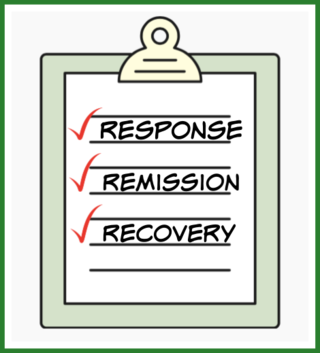Therapy
The Three Goals of Psychotherapy
Response. Remission. Recovery.
Posted August 3, 2019 Reviewed by Hara Estroff Marano

Psychotherapy, often known as Talk Therapy, uses insight, problem-solving, reframing of cognitions and changes in behavior to bring about greater mental well-being. Successful psychotherapy also involves reaching three very important goals:
1. Response
2. Remission
3. Recovery
Problem is, many children and adults don't reach all three - and this sets the stage for relapse of symptoms.
Learning more about response, remission and recovery will help you make the most out of psychotherapy.
Response
The first goal of psychotherapy is to get you to feel better.
This is clinically called response - and is defined as an improvement from the onset of your illness after psychotherapy begins.
Response is reached when, as a patient, you report less depressive symptoms, clinically meaningful improvement in mood, daily functioning, physical pain, and negative thinking. Getting to a response level will be easy for some. Generally, these adults and children report feeling better in a few sessions. For others, it can take weeks. And for those who experience treatment-resistant depression, response may not be achieved at all.
When it comes to attaining a response in psychotherapy, don't compare yourself with another person's experience. Instead, focus on your unique experiences with depression and set realistic goals with your therapist.
Remission
The second goal in treating your depression is to bring you to a full state of remission. Remission is clinically defined as the experience of being symptom-free from illness. This differs from response in that you not only report an improvement from when you started treatment, but you also describe the presence of well-being, optimism, self-confidence and a return to a healthy state of functioning.
It's important to follow your treatment plan so you can achieve a full state of remission. Not doing so can lead to a partial remission - where relapse is likely to occur. A good takeaway here is if you're still experiencing depressive symptoms, you have not reached full remission.
Partial remission signals the need to continue with your treatment for depression. This is where most children and adults with unipolar or bipolar disorders lose their way. They stop taking their medication or interrupt psychotherapy because they "feel better"... but in actuality, they haven't achieved full remission.
Remission will be achieved at different times for different people. Again, don't measure your journey to health against anyone else. Just work your treatment plan and be proud of the gains you make along the way.
Recovery
Recovery is clinically defined as the absence of symptoms for at least 4 months following the onset of remission. Recovery presents with periods of improvement and growth as well as with setbacks and stumbling blocks. So, essentially, you'll have good days and you'll have bad days. It's important to monitor your depressive disorder by being mindful about your physical and emotional experiences - along with many of the other tools and techniques you've learned in psychotherapy. Also, it's vital to keep up with your medication if that's part of your treatment plan.
Research states that more than 50 percent of children and adults who have a mood disorder will not achieve recovery because they're not consistent with their treatment plan.
Summary
Living with a moderate or severe mental illness requires consistent treatment and coordinated care. For those who experience treatment-resistant depression, alternative treatment plans will be created to deal with these unique challenges. But for others who have treatable depressive disorders, strive to make psychotherapy a priority. Aim to reach all levels of response, remission, and recovery.


